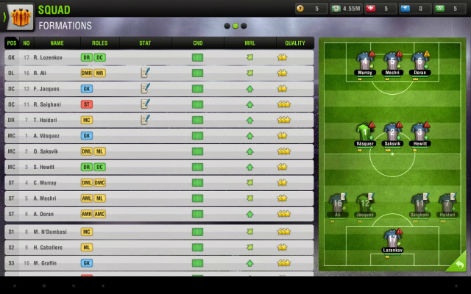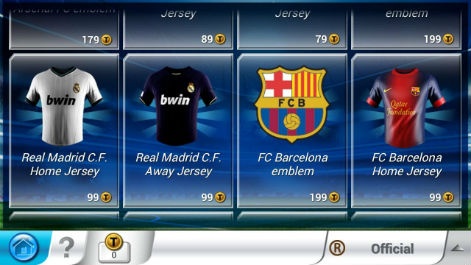With 100 million registered users, Top Eleven is one of the biggest sport games on mobile.
Five years on from its conception by a trio of developers at the then tiny Nordeus HQ, the F2P game has grown to such proportions that if all its players formed a country it would be the 13th largest on Earth.
CEO Branko Milutinovic has overseen this steady growth, with the Serbian firm now employing 170 people across five countries.
We caught up with Milutinovic to find out some of the challenges with scaling a company to that size, and how player expectations are changing when it comes to sports games.
PocketGamer.biz: How do you grow a company from a 3 person startup to a 170 strong mobile gaming powerhouse? Were there bumps along the way?
Branko Milutinovic: A passion for sports and gaming tied us at the very beginning. A goal to build a company of great people gathered around the same vision - engaging the world with cross-platform games - solidified us as a team.
We were lucky to recognise the potential of the mobile gaming market very early on and we developed Top Eleven as the world's first truly cross-platform game, coming from Facebook to mobile devices. Nordeus was among the first companies to enter that market.
What certainly gave us an extra edge is the fact that we had a very talented engineering organisation from day one. This helped us build a very complex platform and product. It is hard to copy, easy to scale up and to develop further.
We then started developing other pillars around our engineering team - game design, art, and business.
How do you retain talent in your company with such a large team?
In the creative industries there is a particularly strong need within people to see their impact and contribution on the company and its products going forward.
I can speak about this because I’ve felt this myself, and it was one of the reasons I left a more ‘traditional’ company to set up my own.
An important factor is to have our people empowered and accountable for all improvements and innovations - from the internal tools we develop, project methodologies, all the way to the final products.
We like to make our organisation ‘flat’; without hierarchy, with full internal transparency.
An important factor is to have our people empowered and accountable for all improvements and innovations.Branko Milutinovic
Nordeus consists of people from all around the world (more than 15 nationalities) in our five offices (Belgrade, London, Dublin, Skopje and San Francisco), so openness and diversity came naturally.
For a true long-term success and employee satisfaction, constant personal and professional growth is crucial. We like to say that our opportunities for learning and development are limitless - no book, conference, training or technology is inaccessible. Internal knowledge sharing is equally important.
In addition to this, we work to be as flexible as possible in order to make it really easy for people to achieve anything they want in both their professional and private lives. Last but not the least, we have excellent compensation packages that enable people from all around the world to join the teams in our offices.
At the end of the day, we aim high in everything we do, and I believe that people feel great knowing that 100 million people play something we have built, in every country of the world.
How have player expectations changed in regards to what they want from mobile games?
First of all, every aspect of technology has evolved. Today, we have many more people on mobile devices than when we created Top Eleven five years ago. This opens an opportunity to build a small niche product that can be very successful. The evolution of hardware also enables developers to build fantastic games visually, and users are really enjoying that.
The devices themselves have evolved, and users can now run very demanding games on them. The F2P model is now commonplace, and users are now willing to frequently spend more, leading to a very high cost of user acquisition.
The core game loops are built in a way that keep our players engaged for years.Branko Milutinovic
It is becoming challenging for the games with low “Life Time Value” (LTV) to be sustainable. The entry bar for studios has risen quite a lot and it is becoming very hard to make an impact, especially for the new companies starting up.
10 million people play Top Eleven every month – what’s your retention secret?
It is simply a good game, which is the main reason for it being successful for this long. The core game loops are built in a way that keep our players engaged for years, using the evergreen spirit of football as a sport.
Being a true cross-platform game and localised in 42 languages makes it even more accessible to play

Another very important factor is the way it boosts social interaction - over time players get to know their “peers” and people they are competing with, and this certainly helps retention levels.
What are some of the mistakes developers commonly make when creating current sports games on mobile?
Experience on mobile devices is very different from console to PC, therefore it’s necessary to adjust the gameplay to these different platforms.
It seems that people in South East Asia are bigger fans of the Premier League than some fans in the UK.Branko Milutinovic
Simply copying the gameplay across is not enough, we should be offering new content and new features, so that they clearly see the advantages of the mobile version - I believe Top Eleven is a good example of that.
Having a mobile version should add value to the player’s experience.
Sports games on console and PC often have extremely loyal fan bases, and this seems to have been replicated in Top Eleven. You were one of the pioneers for cross-platform gaming – did this flexibility help capture players from other mediums?
I’m not sure it captured them, but we can definitely say that our users are still using the PC for longer sessions, while using mobile versions to play while commuting, queuing, at school or at work.
This flexibility is part of what makes it such a popular game.
You skipped the US, yet still achieved global success by targeting non-traditional markets. What drove this decision?
Our vision for growing Top Eleven was related to the popularity of football in certain countries. Football is a global phenomenon watched more or less in every part of the world, however the sport is still in the process of becoming popular in the U.S.
Some of the countries we wanted to target were logical choices, like the UK, Germany, Spain, Italy and Turkey for example. But some other ones surprised us, like Thailand and Indonesia. It seems that people in South East Asia are bigger fans of the Premier League than some fans in the UK.

At the beginning we also needed to invest our money smartly and emerging markets where football was popular, like South East Europe, Turkey, Egypt, Thailand, Malaysia, Indonesia were logical choices until we generated enough revenue to be able to invest in more “expensive” markets such as Germany and the UK.
Have you tried to localise for specific regions?
Top Eleven is translated on 42 languages which are constantly being improved by our community. This approach helped us grow and retain users in markets where the English language is not so dominant.
We also tried to make some small changes in the gameplay for the Korean market last year. Some of the changes we made worked but some of them we did not implement as we should have.
We are also paying a lot of attention to football clubs we are going to work with, such as Real Madrid, AC Milan, Arsenal and Liverpool, as well as some local names like Boca Juniors from Argentina, Pohang Steelers from Korea, Lech Poznan from Poland.
Is there anything that you think we’re not talking about enough as an industry at the moment?
The discovery of new games is becoming increasingly difficult, and I believe it is an issue that deserves more attention and dialogue. The fact that mobile games launched almost 3-5 years ago and are still at the top of global grossing charts is an indication of fault within our industry and how new games are presented.
This trend has already pushed the mobile industry into a “hit” seeking business model, which can be detrimental to the overall health of the industry.
If you have not already built up a massive customer base, to whom you can cross-promote new titles, you either need to be incredibly lucky or invest in a huge marketing budget to promote to your game to even have a chance of repeating the success of the current top-grossing titles.





















